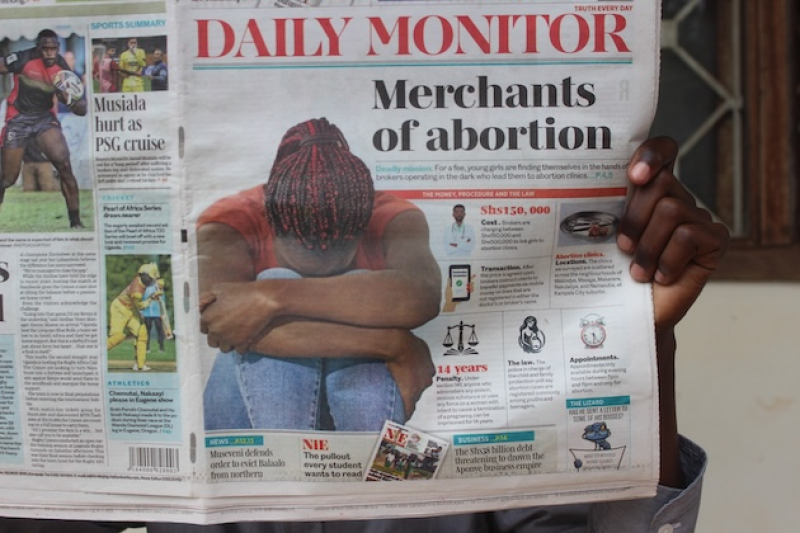- Israeli Aggression against Qatar, Extension of Crimes against Palestine |
- No place is safe in Gaza. No one is safe |
- Stocks fail to recover despite slight gains in Dhaka, Ctg |
- BB Purchases $353m in Dollar Auction to Stabilise Taka |
- Promoting social inclusion of disabled persons thru empowerment |
East Africa’s Clash on Sexual Health Rights and Laws

Abortion is illegal in Uganda. Girls who get pregnant resort to deadly backstreet abortion providers. However, it is also criminal to provide safe abortion services.
Sarah Namukisa nearly missed her final-year exams earlier this year. She was subjected to a mandatory pregnancy test. The 25-year-old student at the Medical Laboratory Training School in Jinja was then expelled because she was pregnant.
While Namukisa’s case sparked public criticism, activists say it was by no means an isolated incident. Across Uganda and other East African countries, pregnant students continue to face expulsion, forced school dropout, and stigma in both public and private educational institutions.
Labila Sumaya Musoke, from the Initiative for Social and Economic Rights (ISER), said the widespread practice reflects deep-seated systemic discrimination and patriarchal control over young women’s bodies and futures. She noted that such expulsions mirror systemic and institutional discrimination that international and regional human rights bodies have explicitly deemed unlawful and incompatible with human rights standards.
Namukisa was fortunate that her case attracted the attention of civil society and Uganda’s Equal Opportunities Commission, which ordered her school to rescind the expulsion. Many young women, however, resort to dangerous “backstreet” abortions in an effort to return to school or higher education. Abortion remains outlawed in Uganda and its neighbours—Kenya and Tanzania.
The most recent Demographic and Health Survey (DHS) across 12 East African countries found an overall adolescent pregnancy prevalence of 54.6 percent. The survey concluded that it is vital to design public health interventions targeting high-risk adolescent girls, particularly those from the poorest households, by enhancing maternal education and empowerment to reduce adolescent pregnancy and its complications.
In Kenya, the teenage pregnancy and motherhood rate stands at 18 percent—about one in every five girls aged 15–19 has either given birth or is pregnant with her first child. In Uganda, the rate has stagnated for over a decade, standing at 25 percent in 2006, 24 percent in 2011, and now rising again to 25 percent. In Tanzania, 22 percent of women aged 15–19 have been pregnant, according to the 2022 Tanzania Demographic and Health Survey.
Rosemary Kirui, Legal Advisor at the Center for Reproductive Rights, said enjoyment of Sexual and Reproductive Health Rights (SRHR) is limited by restrictive laws and policies. “We have a legal environment with laws that criminalise some SRHR services. Most were adopted or inherited from colonialists, and most countries have not reformed them. Penal codes often impose blanket criminalisation of abortion, interpreted narrowly across many African countries,” she said.
She also pointed out that restrictive laws include mandatory third-party consent for adolescents seeking information or reproductive health services.
Primer Kwagala, a Ugandan lawyer and head of the Women Pro Bono Initiative (WPI), said restrictions on abortion cost lives. “Sixteen women die each day due to lack of services in public health facilities. Others die in communities due to unsafe abortion. Outdated colonial-era policies prevent health workers from providing life-saving care,” she noted.
Uganda’s constitution states that no one can take the life of an unborn child except in exceptional circumstances. Although the Ministry of Health has issued guidelines permitting safe abortions in cases of defilement, rape, and incest, Kwagala argued they exist “more on paper than in practice.”
In 2020, the African Committee of Experts on the Rights and Welfare of the Child (ACERWC) ruled against Tanzania, finding its policy of expelling pregnant schoolgirls violated the African Charter, particularly rights to education, health, dignity, and non-discrimination.
Dr. Godfrey Kangaude, a Malawian expert on SRHR, said, “Sex and reproduction are relevant to everyone. Reproductive justice is tied to finance, labour, and overall well-being.” He also highlighted anomalies in age-of-consent laws, which criminalise consensual peer relationships—such as between an 18-year-old and a 17-year-old.
Activists have since 2017 pushed for a regional SRHR law that would harmonise access to reproductive services and information across East Africa. However, the bill has faced resistance, particularly around sex education for teenagers and legal abortion provisions.
Dr. Tom Mulisa, a human rights and constitutional law researcher in Rwanda, noted that SRHR are constitutional rights. He emphasised the Maputo Protocol, which supports safe abortion and women’s health rights, though enforcement remains uneven across the region.
Rwanda stands out for its reforms. Since 2009, it has modernised laws, and earlier this year, Parliament granted adolescent girls the right to access SRH services—particularly family planning—without parental consent, lowering the legal age for contraceptive access from 18 to 15. Rwanda also removed the court order requirement for abortions, expanded access, and made it a crime to deny women contraceptives.
According to WHO, the right to health includes four essential, interrelated elements: availability, accessibility, acceptability, and quality. Rwanda’s reforms now reflect this broader scope, setting an example for the region.

